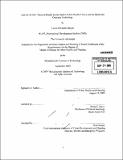Call me 'at-risk' : maternal health in Sao Paulo's public health clinics and the desire for cesarean technology
Author(s)
Denyer, Laurie Michelle
DownloadFull printable version (4.224Mb)
Alternative title
Maternal health in Sao Paulo's public health clinics and the desire for cesarean technology
Other Contributors
Massachusetts Institute of Technology. Dept. of Urban Studies and Planning.
Advisor
Diane E. Davis.
Terms of use
Metadata
Show full item recordAbstract
This paper is based on ethnographic field research undertaken in a public health clinic in the periphery of São Paulo, as well as an examination of the "Humanisation of Childbirth Campaign". The Humanisation Campaign is a Brazilian public health initiative targeted at low-income women that aims to drastically lower country-wide caesarean rates. This paper will consider how pregnant women actively seek to be labeled 'at risk' during ante-natal care by doctors, nurses and health care technicians in order to ensure access to caesarean technology during their birthing process, in order to avoid the discrimination and physical abuse often associated with a vaginal delivery. I suggest that experiences of riscos, or riskiness, bear heavily on women's pragmatic adoption of interventionist birthing. Riscos, as it has been explained to me, is experienced both bodily and socially, as a physical threat to bodies that is experienced via physical and social violence within the clinic. In this paper, I plan to explore the phenomenology of risk, and how, for women from the periphery, risk to body and health is an embodied experience, and situated within the social and political context within which individual experience occurs. Ethnographic work suggests that women seek inclusion into 'expert' biomedical risk assessments and categories that ordinarily exclude or overlook them. This paper will be situated in an examination of the Humanisation of Birth Campaign, it will explore the conflicting meanings about what 'natural, normal and tradtional' means in Brazil, and the ongoing debate over birthing that is currently encapsulated in the narratives surrounding the Humanisation Campaign. (cont.) This pragmatic desire to adopt risk labels offers a window into understanding a new range of questions about how public health narratives have direct implications for women's reproductive health, while at the same time reconfigure women's conceptions of, and negotiations with, bodily risk and flexibility.
Description
Thesis (S.M.)--Massachusetts Institute of Technology, Dept. of Urban Studies and Planning, 2009. Vita. Cataloged from PDF version of thesis. Includes bibliographical references (p. 63-69).
Date issued
2009Department
Massachusetts Institute of Technology. Department of Urban Studies and PlanningPublisher
Massachusetts Institute of Technology
Keywords
Urban Studies and Planning.